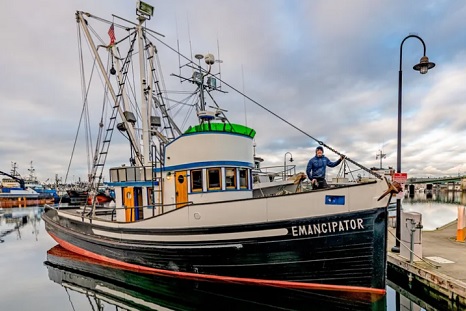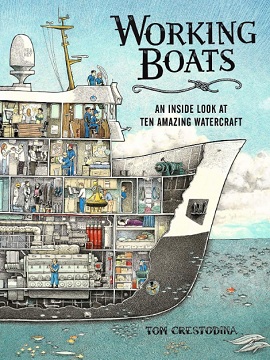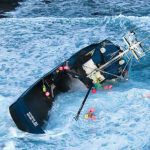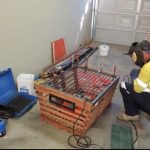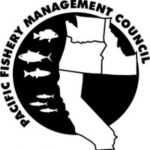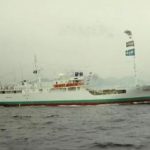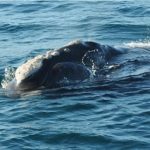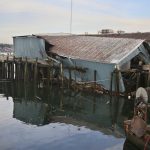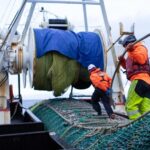Two weeks ago, a fisherman from Bay Center was lost at sea when the crabbing boat he was working on started to sink. Since then, Washingtonians have shown up in droves to help his loved ones search the area in Pacific County. Unfortunately, Bryson Fitch, 23, has still not been found, according to his sister Kelsea Broddy. “We still would love to bring him home, no matter what the condition is,” Broddy said. “That’s just our main goal, is to find him, so we have answers.” Fitch is both a beloved husband and a father of three young children. The boat he was working on, the Ethel May, capsized on Feb. 5 due to rough sea conditions. He reached for the life raft, and he and his two crewmates struggled to get on. Video, >click to read< 11:18
Tag Archives: Washington

F/V Kodiak Enterprise: Unified Command stands down for vessel fire in Tacoma, Washington
The Unified Command composed of Tacoma Fire Department, U.S. Coast Guard Sector Puget Sound, Washington Department of Ecology and Puyallup Tribe of Indians, with support from several other agencies, which was stood up to respond to the April 8 fire aboard the fishing vessel Kodiak Enterprise moored in the Hylebos Waterway in Tacoma, was stood down Friday. Over the last several days, responders alternated between removing fuel and pockets of water, to maintain vessel stability. All of the diesel remaining aboard the vessel was successfully removed with no fuel spilled or sheening observed during defueling operations. Now that the pollution threat has been mitigated, the Unified Command has stood down. >click to read< 08:51
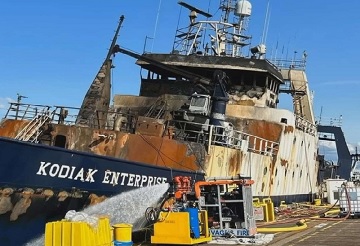
F/V Kodiak Enterprise: Crews removing water, chemicals from Tacoma fishing boat before investigating cause of fire
Crews extinguished the last of the fires Friday but investigators who will look for the cause still aren’t able to set foot on the boat. Officials said a few things need to happen first, like the removal of the gas, oil, and water still on the vessel. “Right now, the biggest priority is dewatering the vessel to right it, ” said U.S. Coast Guard Petty Officer Steve Strohmaier. The 276-foot Kodiak Enterprise still lists to one side. It’s because of the water poured into the boat to put out the flames. Getting that water and other potentially damaging chemicals off the boat is the new priority. >click to read< 07:29
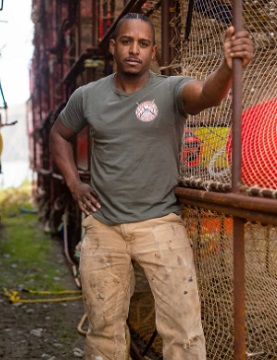
WA deckhand joins ‘Deadliest Catch’s’ 19th season
Jacob Hutchins, a 33-year-old deckhand from Olympia, joins the “Deadliest Catch” cast in its 19th season with one goal: to become the first, as far as he knows, African American crabbing captain on the Bering Sea. Premiering at 8 p.m. April 18 on Discovery Channel, “Deadliest Catch” introduces new characters on each boat with Hutchins paired with Keith Colburn, captain of the Wizard. “He’s got experience, but he’s untested on the Wizard,” Colburn said in preview of the new season that aired last week. A 2008 graduate of Bremerton High School, Hutchins found himself in Grays Harbor County where “you have logging and fishing [as options] if you want to make some money without any real requirement or anything.” >click to read< 09:08
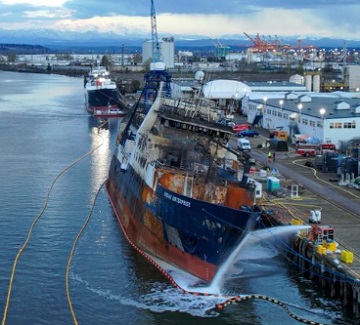
F/V Kodiak Enterprise: Firefighters extinguish hot spots, prepare to scale back response to fishing boat fire in Tacoma
The fire on the 276-foot vessel Kodiak Enterprise started at around 3:30 a.m. Saturday while the boat was moored at Trident Seafoods in the Hylebos Waterway, according to a news release from the U.S. Coast Guard. The fire department is currently working on a demobilization plan to scale back its response to the incident. “Now that it’s safe, we’re actually putting people in those individual rooms [of the vessel] again. Things have cooled down, and we’re actually able to go compartment by compartment and check those off,” said Magliocca. “It seems like there’s no pressure on the tanks that we’ve been worried about, the freon tank and the fuel tank.” Photos, >click to read< 08:05
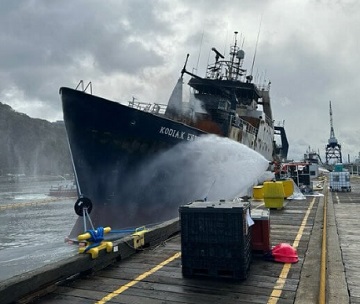
Fire Subsides Aboard Factory Trawler F/V Kodiak Enterprise
Firefighters have begun the process of knocking down the last remaining pockets of fire aboard the factory trawler F/V Kodiak Enterprise, which caught fire at a pier in Tacoma early Saturday. The fire burned through most of the vessel by Monday and decreased further in size on Tuesday, according to the unified command managing the response. The blaze has subsided enough that the Tacoma Fire Department green-lighted operations to access the ship’s interior and begin extinguishing any remaining hot spots. The vessel still has a pronounced list to port, but dewatering operations are under way to restore full stability. A dive inspection on Tuesday found that the ship is intact below the waterline, dispelling earlier concerns that she might be taking on water. Photos, >click to read< 10:47
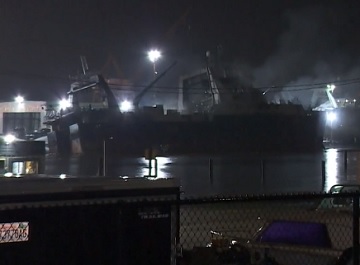
F/V Kodiak Enterprise: Day 3 – Fire crews prioritizing keeping burning Tacoma ship from capsizing
The ship is visibly leaning to the port side, “more than we want it to,” officials said on Monday. The ship is taking on water, but crews working on scene aren’t sure how. Work is underway to pump water out of the ship so it remains stable. A dive operation is also underway so the hull of the ship can be inspected. In the meantime, as the fire continues burning inside, firefighters are keeping their distance. “We’re trying to limit the number of people that go on board,” said Todd Magliocca, an operations leader with Tacoma Fire. Applying water from the inside is risky as crews are trying to prioritize keeping the ship upright. Video, >click to read< 10:32
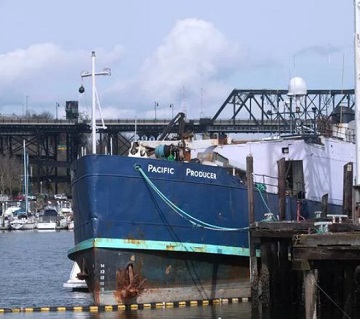
Ship with history of safety, pollution violations moored indefinitely in Tacoma
A 77-year-old fishing ship with a reputation of pollution and safety violations has been docked on the Foss Waterway in Tacoma since August after smashing into a private pier and raising concerns about its integrity. Its owner said he doesn’t know when it will leave. The fishing vessel Pacific Producer arrived at its current location on Aug. 29, according to a nearby condo resident. The 472 gross ton, 169-foot-long boat was built in 1946 and has been working in Alaskan waters until recently. It’s registered to East West Seafoods of Seattle. “Working in the Alaskan fishing industry – an occupation already regarded as one of the nation’s most dangerous – employees aboard the F/V Pacific Producer faced dangers purely of their employer’s making,” >click to read< 09:23
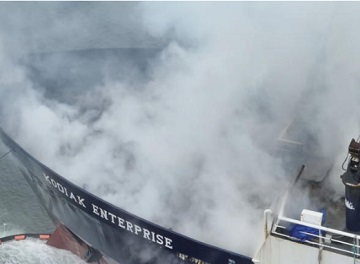
F/V Kodiak Enterprise: Shelter-in-place remains in effect as fishing boat fire continues to burn
A massive fishing boat fire in Tacoma just northwest of Chinook Landing Marina continues to burn Monday. On Monday morning, smoke from the fire continued but had visibly lessened. The fire on the 276-foot vessel Kodiak Enterprise started at around 3:30 a.m. Saturday while the boat was moored at Trident Seafoods in the Hylebos Waterway. Trident Seafoods said there were three people on board the ship when the fire started but they made it out safely without any injuries. The cause of the incident is under investigation. Photos, >click to read< 11:42
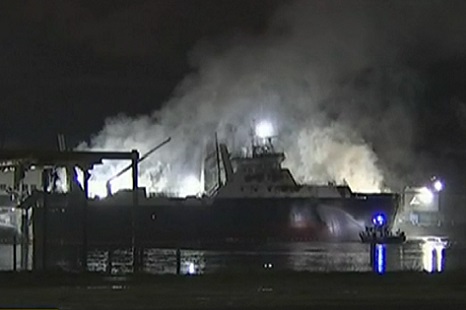
Authorities respond to fishing vessel fire in Tacoma; shelter-in-place order issued for nearby areas
The Tacoma Fire Department has issued a temporary shelter-in-place order for some areas after a fishing vessel caught fire early Saturday morning, according to a news release from the U.S. Coast Guard. The order applies to the Northeast Tacoma, Browns Point and Dash Point neighborhoods. Residents in these areas are advised to stay indoors and limit exposure to smoke. The Coast Guard has closed the Hylebos Waterway to all commercial and recreation vessel traffic at this time and has deployed the Coast Guard Cutter Osprey and Station Seattle to enforce the closure. 17 photos, >click to read< 20:39
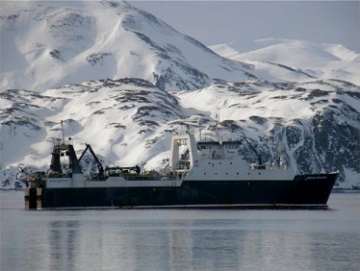
Unified command responds to fishing vessel fire in Tacoma, Washington
The Tacoma Fire Department, the Coast Guard, the Environmental Protection Agency, the Washington Department of Ecology and other agencies are continuing their response to the fishing vessel, F/V Kodiak Enterprise, that caught fire early Saturday morning while moored at Trident Seafoods in the Hylebos Waterway in Tacoma. The fire has progressed throughout the ship and was last reported approximately 100 feet from the vessel’s freon tanks. The vessel is reported to have an estimated 55,000 gallons of diesel and 19,000 pounds of freon onboard. The heat from the fire can cause pressure to build in the freon tanks. >click to read more< 17:44
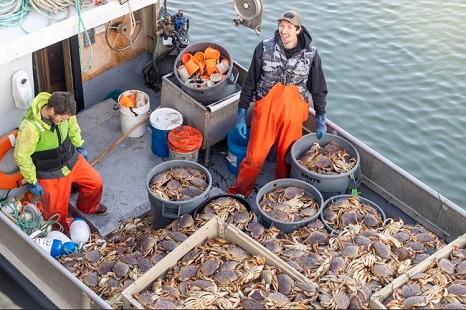
Willapa Bay crabbers deliver record haul
More than 1.5 million pounds of Dungeness crab have been caught by commercial fishermen in the bay this year, far exceeding previous annual landings records over the past 25 years. Despite a two-month delay in the 2022-2023 season that eventually began Feb. 1, the current commercial Dungeness landings are about 1.54 million pounds as of Monday, March 27, a roughly 23% increase over the previous record of 1.19 million pounds caught during the entire 2010-2011 season. Pinched by inflated fuel and expenses and a low price from processors, commercial crab fishermen would rather put this current season behind them as they prepare for the next fishery. “It’s been above average,” said commercial fishermen Ross Kary. “But with the crab price it’s still not the best year I’ve had. With the price of everything, expenses are really high. We were lucky to not go bankrupt.” Photos, >click to read< 20:20
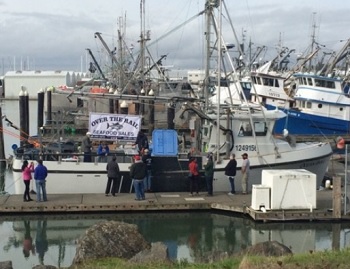
Crew Connections to provide commercial fishing networking on March 18
Commercial fishing vessel captains and owners will be recruiting new crew members to help with the summer fishing season from 11 a.m. to 2 p.m. Saturday, March 18 at Bellingham Dockside Market. Those interested are encouraged to bring their resume and ask questions. Whatcom Working Waterfront Coalition and Foundation is hosting the networking event, Crew Connections, in partnership from the port of Bellingham and Bellingham Dockside Market. Crew Connections will take place at the Fishermen’s Pavilion, 2599 S. Harbor Loop Drive in Bellingham. >click to read< 12:55
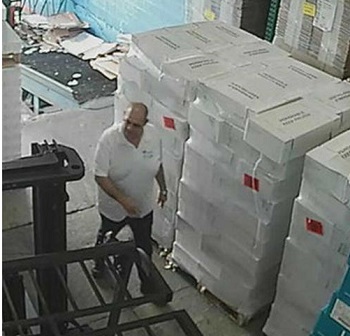
Florida man used fake names in six-figure Stanwood crab heist
A Florida man faces federal charges in a conspiracy to transport over $430,000 worth of stolen king crab from Stanwood to Florida, according to charges filed in U.S. District Court in Seattle. A federal grand jury indicted David Subil, 51, on three counts of interstate transportation of stolen property on March 1. The alleged cross-country crab heist began Jan. 3. Multiple people claiming to represent Safeway contacted the owner of a California-based seafood distribution company called Arctic Seafoods, the charges say. A man who identified himself as Christopher Delgado sent the owner documents to open an account with Albertsons, the parent company of Safeway. >click to read< 10:20
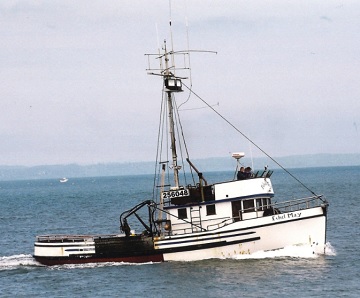
Drone scours half of WA coast in search of missing fisherman
A drone with a camera last weekend flew over 109 miles of Pacific coastline, from the mouth of the Columbia River to the Quinault Indian Reservation, but found no sign of Bryson Fitch, the missing crab fisherman who was lost at sea almost one month ago when his vessel capsized near Willapa Bay. Since then, meticulous beachcombing efforts by the Willapa Bay community have discovered parts of the F/V Ethel May, including the hull, stern, wheelhouse and other miscellaneous equipment, on beaches from Long Beach to Westport, but Fitch has yet to be found. Drone images from the most recent search revealed similar pieces from the broken fishing vessel, but most had already been discovered, according to drone pilot John Jones. >click to read< 11:40
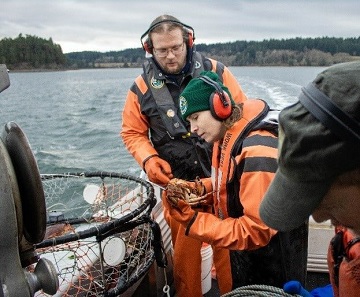
Crab fishing remains lucrative, critical industry for Gig Harbor fishermen
Off the coast of Washington, several Gig Harbor residents are hard at work on crab fishing boats, handling all that comes with the job. A handful of Gig Harbor residents hold commercial crab fishing licenses. Several others are crab license lease holders. The state capped the number of available commercial crab fishing licenses at 220 in the 1990s. The intent was to manage crab populations, and also limit the amount of gear in the water to protect other sea life, such as whales, said Dan Ayers, coastal shellfish manager with the Washington Department of Fish and Wildlife. Commercial crab fishing was an estimated $86 billion industry in Washington state in 2022. That total includes boat sales, gear, and processing facilities that handle the harvests. >click to read< 09:24
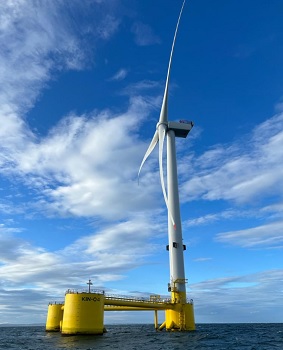
Panel discusses impact of offshore wind on West Coast fisheries
The Biden administration has called for deploying 30 gigawatts of offshore wind energy to combat climate change by 2030. Depending on where the turbines are placed, they could displace highly productive fishing grounds that account for billions of dollars and thousands of jobs in Oregon, Washington and California. Projects must be planned carefully using the best available science to mitigate potential damage, according to a panel of experts who spoke March 1 at the Northwest Offshore Wind Conference in downtown Portland. >click to read< 11:52

Family of missing Washington crab fisherman pushes for mandatory personal locator beacons
It has now been more than three weeks since Bryson Fitch, a 23-year-old Washington father of three went missing at sea after the crabbing boat he was working on started to sink. As his family continues scouring the beaches near Willipa Bay searching for him, his mother-in-law is hoping to bring awareness to the federal maritime laws regarding wearable locator devices. She believes a change in that law may have prevented her family’s heart-wrenching loss. “If they would have showed up — when they rescued those two guys — and he had a beacon on his belt, they would have found him,” said Briee Roby, Fitch’s mother-in-law. Video, >click to read< 13:00
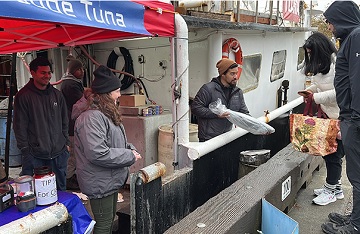
Part II: F/V St. Jude – A Taste for Tuna
Joe Malley has reeled in a lot of different fish in his over 40-year commercial fishing career, but tuna has a special place in his heart. And on his plate. “When I’m fishing halibut, the last thing I want to see on my plate is halibut,” he said. “If I’m fishing salmon, I don’t want even a beautiful King salmon. But when I’m fishing tuna, you can serve it to me all day, every day.” Tuna doesn’t have a big statement to make, Malley said. “It’s the perfect American fish – odorless, colorless, and tasteless. And tuna can be incorporated into dishes in so many ways; for instance, you can stir fry it just like chicken. ”For Malley, his wife Joyce, and their five-person crew, tuna is a way of life. The F/V St. Jude crew spends 12 months a year on a quest for albacore tuna — from the North Pacific in summer to the South Pacific in fall. >click to read< 12:37
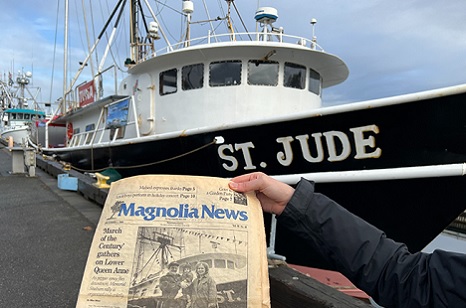
The Adventure of an Unconventional Career
Joe Malley keeps a faded but well-loved copy of the December 1, 1999 edition of the Magnolia News as a reminder of his family’s commercial fishing journey over the last two-plus decades. The photo and headline above the fold features Malley, his wife Joyce, and their young son Liam (now 24) standing in front of their new (at the time) fishing vessel, moored at the Port of Seattle’s Fishermen’s Terminal, as they prepared to embark on a new journey. The St. Jude, a 95-foot-troller, still makes its home at Fishermen’s Terminal today. Some things haven’t changed in the 23 years since the Magnolia News article was written. The St. Jude crew still fishes 12 months a year, chasing Albacore tuna from the North Pacific in summer to the South Pacific in fall. In between journeys they sell their catch off the St. Jude at Fishermen’s Terminal. >Photos, Video, click to read< 09:17
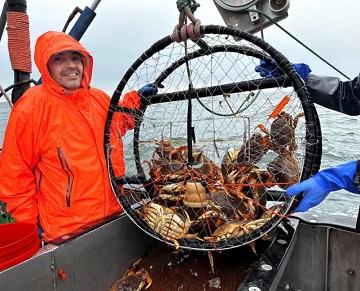
Dungeness crab at $5.99/lb. Nice! But crab fishers get $2/lb. Tough deal.
Remember a year ago, and the $18.99 up to $24.50 a pound prices? When you hear about a “market correction,” here it is in a dramatic display: a plunge of two-thirds or more. There are plenty of reasons why. For the Dungeness crab fishers, a number of them small operators, it’s tough days. They’re getting $2 a pound, maybe $2.25 a pound wholesale for the crabs. In last winter’s boom times they were getting $5.50 a pound from processors. “I haven’t seen this low a price in over a decade. It’d probably be cheaper not to fish. But we can’t not fish, if that makes sense. We have to keep making our payments or we’ll end up in a loss,” says Jennifer Custer, who does the bookkeeping while her husband, Chuck Custer, runs their 46-foot fishing boat, the Miss Kathleen, out of Westport. >click to read< 09:43
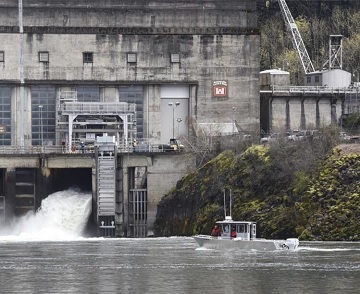
Sea lions threaten Northwest’s salmon – Pinnipeds eating thousands of at-risk fish in Columbia River
Decadeslong efforts by state and tribal agencies have slowly curbed sea lion populations in the region, yet officials still consider the pinnipeds a threat to at-risk salmon populations in the Columbia River. Between August 2021 and May 2022, officials estimate, more than 7,000 fish in the Bonneville Dam tailrace were killed by Columbia River sea lions, according to the Portland U.S. Army Corps of Engineers’ 2022 predation report. This totals about 12.4% of the salmon run accounted for during the agency’s observation period. Dozens of sea lions congregate at the dam in the fall, winter and spring. They feast on chinook, steelhead and coho salmon, as well as sturgeon and other fish. Spring chinook salmon were disproportionately affected, accounting for roughly 4,400 of the 7,000 fish killed. >click to read< 07:55
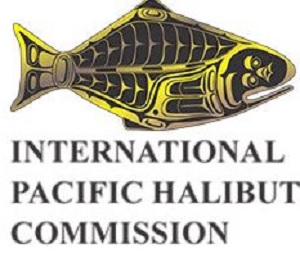
Commission cuts halibut limits across Alaska, Canada
The International Pacific Halibut Commission adopted its annual catch limits for halibut in 2023 from California to the Bering Sea at its meeting Jan. 27. Coastwide, the total constant exploitation yield, a term for how many total halibut longer than 26 inches are removed from the population, regardless of reason, is just shy of 37 million pounds, a 10% drop from 41.2 million pounds last year. Every regulatory area received a cut except for 2A, which covers California, Oregon and Washington. Area 3A, which covers the central Gulf of Alaska, and area 4A, which covers the eastern Aleutians, saw the largest cuts at 17% each. Southeast Alaska only saw a 1% cut, while the western Gulf, western Aleutians and central Bering Sea each saw 6% cuts. The Canadian coast saw a 10.3% cut. >click to read< 11:50
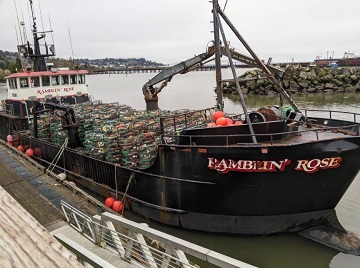
Crab fishermen weather a bruising season
It was a dream season for Oregon’s Dungeness crab fishery last year. Fishing began on the traditional Dec. 1 opener for the first time in years. Domoic acid, a marine toxin that has hampered the valuable commercial fishery time and again in recent years, was almost nowhere to be seen in Oregon or Washington state waters. “Last season, everything that could go right went right,” said Tim Novotny, executive director of the Oregon Dungeness Crab Commission. “And this year — I don’t know if it’s been completely the opposite, but it’s been close.” >click to read< 07:22
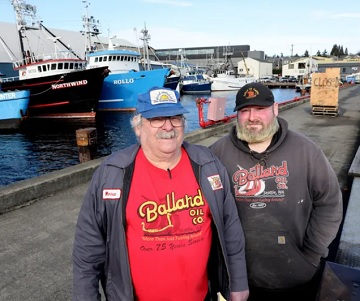
Ballard Oil closes after 85 years in Seattle, where oil and water no longer mix
Since 1937, Ballard Oil had been a fixture on the Lake Washington Ship Canal just east of the locks, providing fuel, lubricants and a few parts to Seattle’s commercial fishing boats, tugs and other vessels. Warren Aakervik Jr., 79, the second of four generations to run the company, cites a long list of reasons for the closure. Among them, costly regulations, rising taxes, a shortage of workers, a dwindling customer base and, most famously, the possibility that the city of Seattle might run the Burke-Gilman Trail though Aakervik’s industrial backyard. “It’s death by a thousand cuts,” says Aakervik as he stands with his grandson, Brandon Millard, on the company’s now-deserted fueling dock. “You keep on, keep on, keep on — and then finally, you just say, ‘Why am I beating my head against the wall?’” >click to read< 09:12

Community determined to find missing fisherman
More than one week has lapsed since the fishing vessel Ethel May capsized near Willapa Bay and left one crew member missing on Feb. 5, but the man still hasn’t been found despite a growing effort to do so by the community and Pacific County officials. The search is for Bryson Fitch, 25, crab fisherman, husband, and father of three young children. An outpouring of support for the family of Fitch, and for the effort to find him, has swept the community since the F/V Ethel May capsized. “There is a huge community support and volunteers all over the county,” said Pacific County Sheriff Daniel Garcia on Friday in an interview. “There are some combing the beaches on foot, there are some flying drones, there are some who have their personal boats that are searching areas and coastlines.” Photos, >click to read< 14:55
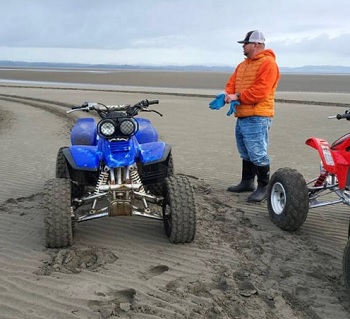
County, community continues search for missing fisherman
After the U.S. Coast Guard suspended the official search for the missing fisherman from the Ethel May, a fishing vessel that capsized Sunday evening, local agencies and community members continued to scour Willapa Bay for signs of the lost man. On Facebook Tuesday morning, Pacific County Sheriff’s Office said it was searching for a man named Bryson Fitch. Fitch, 25, a longtime fisherman, husband and father of three young children, remained missing after the 46-foot crab boat Ethel May sank in heavy seas near Willapa Bay Sunday night. An extended search by the Coast Guard and state and local agencies was suspended Monday evening. “Please don’t stop searching. He is out there,” McKenzie Salas, Fitch’s wife, wrote on Facebook. “He is a fighter. Please keep looking. We need to bring him home. Anyone and everyone please.” >click to read< 12:34
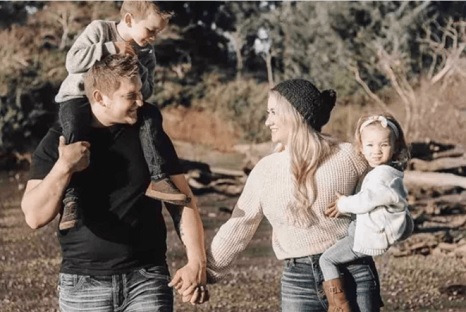
If You Eat Dungeness Crab, Please Help This Family (or even if you don’t, but can help)
Sunday, February 5th was another day in the long life of the F/V Ethel May, a wooden 46-foot crabber built in 1948 in South Bend, Washington, but it was to be her last. Crews from U.S. Coast Guard Station Grays Harbor and Air Station Astoria responded to the sinking after an emergency beacon was activated and the wife of one of the men called 911 to report an emergency onboard. An MH-60 Jayhawk helicopter from the air station was able to rescue two crewmen from a life raft at about 8:10 p.m. Unfortunately, the Ethel May had a crew of three, so one did not come home, and the official search was called off at 5:30pm Monday after almost a day of looking methodically. The name of the missing fisherman is Bryson Fitch, and he leaves behind a wife and three young children (aged 6, 4 and 4 months). >click to read< 10:03






